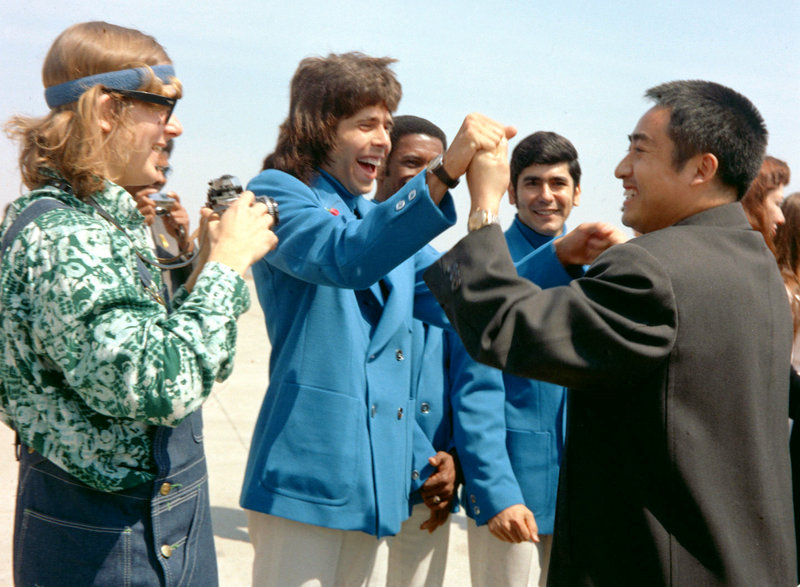It might have been a chance meeting or a cunning act of propaganda, but the encounter more than 40 years ago between two pingpong champions — one Chinese, the other American — launched what President Richard Nixon would call “the week that changed the world.”
Zhuang Zedong, the captain of the Chinese team competing at the 1971 World Table Tennis Championships in Japan, was at the back of his team’s bus when its doors swung open for a straggler, American juniors champion Glenn Cowan.
With the United States and China still stuck in the Cold War, none of the Chinese players dared utter a word to the American. Ten minutes passed in silence.
Then, Zhuang, against the advice of his teammates, made his way up the aisle to the lanky, long-haired player from Santa Monica College.
Through an interpreter, he asked Cowan’s name and offered friendship and a silk portrait of China’s famous Huangshan Mountain.
When they arrived at the main tournament hall a few minutes later, the Chinese athlete and his new acquaintance stepped off the bus into history.
Zhuang, whose gesture launched “the ping heard around the world,” died Sunday in Beijing. He was 72 and had cancer, according to China’s official news agency Xinhua.
A three-time world table tennis champion, Zhuang became an unlikely ambassador for a country that had been closed to Americans since the communist takeover of China in 1949. After the April 4, 1971, meeting on the bus, photos of a smiling Zhuang and Cowan flashed around the world, presenting the Chinese government with a unique opportunity: To the astonishment of much of the world, it invited the American pingpong team to Beijing. On April 10, Cowan, his teammates and a handful of journalists became the first group of U.S. citizens to visit China in two decades.
Less than a year later, in February 1972, Nixon visited China in a historic move toward normalizing relations with a longtime nemesis. In April, the Chinese and American teams toured the U.S. in a riveting display of “pingpong diplomacy.”
The unusual merger of statecraft and sports “turned the familiar big-power contest into a whole new game,” Time magazine wrote.
Zhuang, whose athletic prowess had made him a national hero, was not shy about claiming credit for the stunning turnabout.
“The Cold War,” he told a reporter years later, “ended with me.”
The rapprochement of East with West was, of course, far more complicated than that. Henry Kissinger, Nixon’s national security adviser, was among those who questioned whether Zhuang’s befriending of Cowan had been a fluke. “One of the most remarkable gifts of the Chinese is to make the meticulously planned appear spontaneous,” he wrote in his memoir “White House Years.”
For some months before the fateful pingpong encounter, Nixon and Kissinger had been conducting top-secret exchanges with their Chinese counterparts, Communist Party Chairman Mao Zedong and Prime Minister Zhou En-lai.
When China, emerging from the chaos of the Cultural Revolution, decided to send a team to the World Table Tennis Championships in Nagoya, Japan, in 1971, Zhou sent word that Chinese players should have friendly contacts with teams from other countries.
“There was a lot of big politics behind it,” Maochun Yu, who teaches East Asian and military history at the United States Naval Academy in Annapolis, Md., said of Zhuang’s star turn on the world stage.
Zhuang “was politically astute and also he was a three-time champion, so he had a certain hubris and prestige to act with little bit of freedom,” Yu said.
“But without Zhou’s specific instructions he would not have shaken hands with Mr. Cowan, let alone give him the gift. Nothing was specifically instructed, but he understood what needed to be done.”
“He said what he was supposed to say and said it smoothly,” recalled China scholar and University of California, Riverside, professor Perry Link, who served as a translator for the Chinese team in 1972.
Send questions/comments to the editors.



Success. Please wait for the page to reload. If the page does not reload within 5 seconds, please refresh the page.
Enter your email and password to access comments.
Hi, to comment on stories you must . This profile is in addition to your subscription and website login.
Already have a commenting profile? .
Invalid username/password.
Please check your email to confirm and complete your registration.
Only subscribers are eligible to post comments. Please subscribe or login first for digital access. Here’s why.
Use the form below to reset your password. When you've submitted your account email, we will send an email with a reset code.